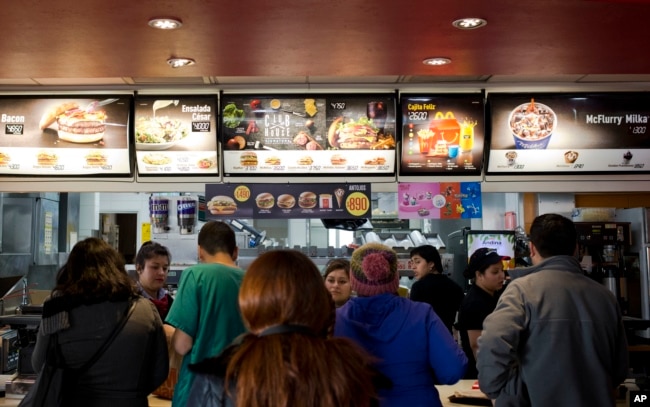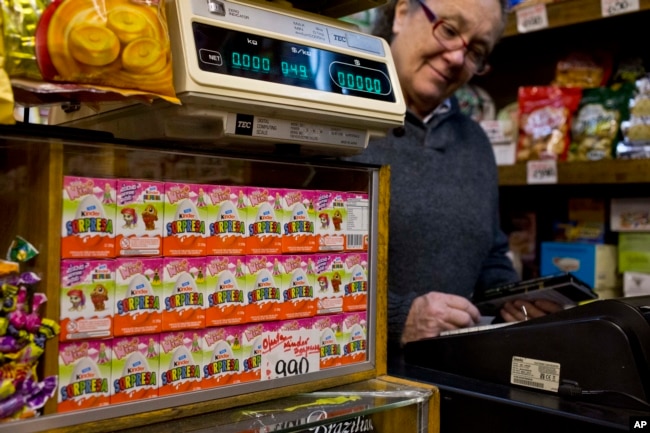Reforming a Deleterious Food Culture : Then Reversing It
"It was a hard-fought guerrilla war. People have a right to know what these food companies are putting in this trash and with this legislation, I think Chile has made a huge contribution to humanity."
"Sugar kills more people than terrorism and car accidents combined. It's the poison of our time."
Senator Guido Girardi, vice-president, Chilean Senate
"I never really paid attention to labels."
"But now they kind of force you to pay attention. And if I don't notice, my kids do."
Patricia Sanchez, 32, accountant
"Originally we didn't believe the logos would make much of a difference, but in focus groups, we've discovered that kids really do look at them."
"They'll say, 'Mom, this has so many logos I can't bring them to school. My teacher won't allow it'."
Dr. Camila Corvalan, University of Chile
 |
| This product sold in a supermarket carries the labels required by law to show the levels of calories, sugars and fats, in Santiago, Chile, June 27, 2016 Associated Press |
Across the globe, countries rich and poor have been struggling with the reality of rising rates of obesity in their populations, and lock-step with a hugely overweight population comes strains on any health care system alongside an increasingly troublesome mortality rate as diseases such as diabetes, heart and stroke take their toll in association with a public so accustomed to fast food outlets proliferating with cheap, non-nutritious food heavy in fat, sugar and salt that they imperil themselves.
And as governments begin to realize that processed food manufacturers have lured consumers with their public relations ploys and clever advertising marketed to grasp the attention of the most vulnerable, their efforts at persuading giant food corporations to diminish the assault on consumers' appetites has had minimum success. Chile prepared itself to take a more aggressive approach rather than rely on compliance on the part of processed food manufacturers.
Its soaring obesity rates have sounded a panic bell. Up to the late 1980s Chile faced a different kind of problem, where widespread malnutrition among poor Chileans, children in particular, was their nightmare. At the present time in Chile, an estimated three-quarters of adults are considered to be overweight or obese, according to the nation's ministry of health statistics. Childhood obesity in particular shows rates that rival the world's highest. Over fifty percent of six-year-old children are overweight or obese in Chile.
The strains on the health system are acute, with the medical costs of obesity reaching $800-million in 2016, representing 2.4 percent of all spending on the nation's health care file. This is a figure projected by analysts to reach close to four percent by 2030. These statistics and the fact that they will only increase finally spurred the Chilean government to unleash marketing restrictions, mandatory packing redesigns and labelling rules in hopes of achieving a social transformation.
 |
| Customers stand in line at a fast food restaurant in Santiago, Chile, June 22, 2016. |
Experts in nutrition recognize the measures as the world's most ambitious effort to refurbish an entire nation's food culture to save the population from itself. Should it succeed, it could represent a model for other countries with similar problems to turn around their obesity epidemic contributing to four million premature deaths annually resulting from the global emergency of obesity. "It's hard to overstate how significant chile's actions are -- or how hard it has been to get there in the face of the usual pressures", commented Stephen Simpson, director of the Charles Perkins Centre, representing scholars focused on nutrition and obesity science and policy.
Chile's food law was put into motion two years ago, forcing multinationals like Kellogg to abandon their iconic cartoon characters so attractive to children. Cereal boxes loaded with sugar are now absent those child-centric cartoons. Kinder Surprise candies have been banned from using trinkets to attract children. Chilean schools are now prohibited from selling junk food like perennial favourites, ice cream, chocolate and potato chips. Television programs aimed at children may no longer advertise these products.
In an effort to persuade Chilean mothers that breastfeeding is the best option for healthy babies, a ban on marketing infant formula will be initiated this coming spring. Chile has mounted an 18 percent tax on beverages high in sugar. A new labelling system has been instituted requiring packaged food companies to include black warning logos prominently in the shape of a stop sign on any packaged foods high in sugar, salt, calories or saturated fat.
 |
| Candy store owner Sofia Rumpf attends a customer in Santiago, Chile, June 24, 2016 photo. |
Chilealimentos, an industry association, is fighting back. Its director states the new nutrition labels are confusing and "invasive", the marketing restrictions based on a scientifically flawed correlation between consumers' weight gains and the promotion of unhealthy foods. "We believe that the best way to approach the problem of obesity is through consumer education that changes people's habits", he stated rather piously, given that the advertisements used by his industry have already achieved that end.
Over 1,400 food items representing 20 percent of all food products sold in Chile have been reformulated since the law was enacted, according to AB Chile, a food industry association. Coca-Cola initiated an advertising campaign for new Sprite and Fanta versions with the tag line "Free of Logos, Equally Rich" reflecting that those drinks no longer contain warning labels since half the sugar has been replaced by artificial sweetener. Raising other alarm flags.
A Kinder Surprise company executive from Italy and the Italian ambassador to Chile accused Dr. Jaime Burrows Oyarzun, the vice-minister of public health, of waging "food terrorism", during a trip to his office. Managing director at Ferrero, Mauro Russo, claimed Chile's law had been erroneously applied to Kinder Surprise, since the toy is an intrinsic part of the treat and certainly not to be mistaken for a "promotional gadget", as the law would have it. "Kinder Surprise's impact on obesity is very marginal", he insisted.
Chile's current president who lent himself to the new consumer-protective food laws is due to step down from the presidency. His successor is the former president, recently re-elected to the office, a conservative businessman who during his first term in office, vetoed the food bill in 2011. His incoming administration had formerly backed a nutrition initiative financed by multinational food companies emphasizing healthy recipes, exercise and moderation related to junk food.
The incoming president's intention, noted a spokesperson, would be to take a second look at the law, to explore ways "to improve it", once he takes office. His wife had led the campaign financed by the multinational food companies. "We don't need more taxes", she said recently.
Labels: Chile, Health, Nutrition, Obesity, Processed Food

<< Home